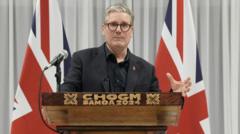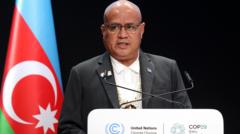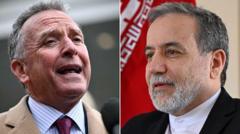**Commonwealth heads of government express a commitment to discussing reparations related to the slave trade, even as the UK maintains its position of non-payment.**
**Commonwealth Leaders Push for Reparations Dialogue Post-Summit**

**Commonwealth Leaders Push for Reparations Dialogue Post-Summit**
**Calls for reparatory justice gain traction despite UK's firm stance against financial compensation.**
In a significant development at the Commonwealth summit held in Samoa, leaders reached a consensus that the "time has come" for engaging in dialogue surrounding reparations for the slave trade. This announcement comes despite the UK government's attempts to keep the topic off the summit agenda. The statement, endorsed by 56 heads of government—including UK Prime Minister Sir Keir Starmer—recognized the need for "meaningful, truthful, and respectful conversation" about the legacy of the transatlantic slave trade.
While Sir Keir affirmed that discussions did not center on financial reparations at the summit, he acknowledged the increasing pressure from Commonwealth leaders urging the UK to apologize and take accountability for its historical complicity in slavery. During a press conference following the summit, the Prime Minister remarked that the focus was predominantly on issues like resilience and climate change, downplaying reparations as a minor part of the discussions.
Despite public assurances to maintain a clear stance against repayment, UK officials have expressed willingness for continued dialogue regarding reparative justice. Future forums, including the upcoming UK-Caribbean meeting, are expected to further explore this sensitive topic. Frederick Mitchell, the Bahamas' foreign minister, hinted at expectations for a "comprehensive report" and indicated that financial reparations could eventually be on the table for discussion.
At the helm of negotiations, the newly appointed Commonwealth Secretary-General, Shirley Ayorkor Botchwey of Ghana, emphasized her commitment to the principles of reparatory justice and encouraged educational programs, public health initiatives, and formal apologies as potential pathways for addressing the historical injustices of slavery.
As Commonwealth nations prepare for future discussions, the reparations dialogue is likely to remain a focal point, particularly in light of previous estimates suggesting the UK may owe over £18 trillion for its role in slavery. Expectations are high that reparations will take center stage at the next Commonwealth summit, pushing the envelope on a topic many leaders believe can no longer be ignored.
While Sir Keir affirmed that discussions did not center on financial reparations at the summit, he acknowledged the increasing pressure from Commonwealth leaders urging the UK to apologize and take accountability for its historical complicity in slavery. During a press conference following the summit, the Prime Minister remarked that the focus was predominantly on issues like resilience and climate change, downplaying reparations as a minor part of the discussions.
Despite public assurances to maintain a clear stance against repayment, UK officials have expressed willingness for continued dialogue regarding reparative justice. Future forums, including the upcoming UK-Caribbean meeting, are expected to further explore this sensitive topic. Frederick Mitchell, the Bahamas' foreign minister, hinted at expectations for a "comprehensive report" and indicated that financial reparations could eventually be on the table for discussion.
At the helm of negotiations, the newly appointed Commonwealth Secretary-General, Shirley Ayorkor Botchwey of Ghana, emphasized her commitment to the principles of reparatory justice and encouraged educational programs, public health initiatives, and formal apologies as potential pathways for addressing the historical injustices of slavery.
As Commonwealth nations prepare for future discussions, the reparations dialogue is likely to remain a focal point, particularly in light of previous estimates suggesting the UK may owe over £18 trillion for its role in slavery. Expectations are high that reparations will take center stage at the next Commonwealth summit, pushing the envelope on a topic many leaders believe can no longer be ignored.




















